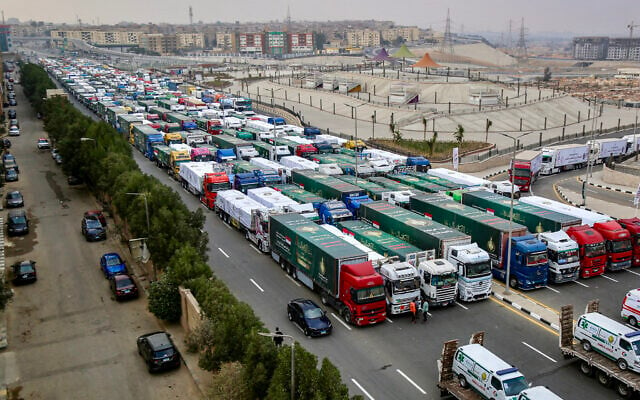



Two Hamas terror group officials on Wednesday accused Israel of holding up the delivery of humanitarian aid to the Gaza Strip in violation of its obligation under the hostage-ceasefire deal signed earlier this month, and threatened that the alleged delay would impact the release of hostages. Israel quickly denied the terror group’s claims, calling it “fake news.”
“We warn that continued delays and failure to address these points [delivery of key aid] will affect the natural progression of the agreement, including the prisoner exchange,” a senior Hamas official told AFP, speaking on condition of anonymity.
Another official, also speaking on condition of anonymity, said the group had asked mediators to intervene in the issue.
A spokesperson for COGAT, the Israeli Defense Ministry body responsible for overseeing the delivery of humanitarian aid to Gaza, dismissed the Hamas officials’ claim as “totally fake news.”
“Since Sunday and until today at 1 p.m., 3,000 aid trucks had entered Gaza,” the spokesperson said. “The agreement says it should be 4,200 in seven days.”
More than 600 trucks of aid have been entering the enclave each day since a hostage-ceasefire deal — which included aid requirements — went into effect on January 19, but Hamas officials contended that Israel was failing to send key aid items including fuel, tents and heavy machinery, according to AFP.
“According to the agreement, these materials were supposed to enter during the first week of the ceasefire,” the senior Hamas official told the news agency.
“There is dissatisfaction among the resistance factions due to the occupation’s procrastination and failure to implement the terms of the ceasefire, particularly regarding the humanitarian aspects,” he added.
The deal stipulates that at least 600 trucks of humanitarian aid will enter the Strip each day. Daily deliveries have in fact surged tenfold since the deal went into effect, according to UN data, meaning those levels have been surpassed on some days.
The deal stipulates that 50 of the trucks each day must be carrying fuel. AFP did not cite any evidence provided by the Hamas officials or any other source for the assertion that fuel or other materials were not being included in the shipments.
The two officials told AFP Hamas had raised the issue during a meeting with Egyptian mediators in Cairo on Wednesday.
“We hope and call on the mediators and guarantors to do everything possible to ensure that the occupation implements the terms of the agreement and allows the entry of these materials,” the senior official said.
The latest warning by Hamas comes as the terror group is expected to release three hostages on Thursday. Two have been identified as civilian Arbel Yehoud and soldier Agam Berger. Hamas is expected to name the third on Wednesday.
A further three hostages are set to be released on Saturday.
Eighty-seven of the 251 hostages abducted by Hamas on October 7 remain in Gaza, including the bodies of at least 34 confirmed dead by the IDF. The bodies of 40 others have been recovered throughout the course of the war.
So far, seven hostages have been freed as part of the current deal, which mandates the release of 33 so-called “humanitarian hostages” during its first 42-day phase, with fighting stopped in the Strip.
As those hostages — women, children, elderly people, and sick people — are gradually released, Israel is to release some 1,904 Palestinian security prisoners, including more than a hundred serving life sentences for terror attacks.
The three-phase deal’s later stages are subject to negotiations with the stated goal of reaching a “sustainable calm” in the enclave, alongside the release of the remaining hostages held in Gaza, the release of more Palestinian security prisoners, and an Israeli withdrawal from the Strip.
The war in Gaza began on October 7, 2023, when some 3,000 Hamas-led terrorists invaded southern Israel, killing some 1,200 people — mostly civilians — and taking 251 hostages, amid rampant acts of brutality and overt targeting of civilians.


